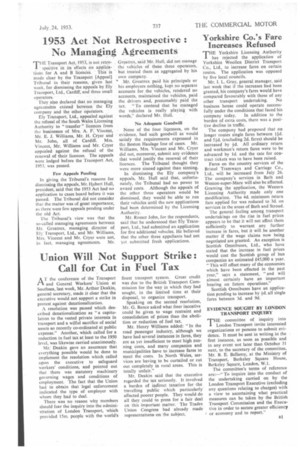Union Will Not Support Strike : Call for Cut in Fuel Tax
Page 35

If you've noticed an error in this article please click here to report it so we can fix it.
AT the conference of the Transport and General Workers' Union at Southsea, last week, Mr. Arthur Deakin, general secretary, made it clear that the executive would not support a strike in protest against denationalization.
A resolution was passed which described denationalization as "a capitulation to the vested private interests in transport and a wilful sacrifice of social assets so recently co-ordinated at public expense." Another, which called for a reduction in fuel tax at least to the 1950 level, was likewise carried unanimously.
Mr: Deakin gave an assurance that everything possible would be done to implement the resolution which called upon the executive to safeguard workers' conditions, and pointed out that there was statutory machinery governing wages and conditions of employment. The fact that the Union had to obtain that legal enforcement indicated the type of employer with whom they had to deal.
There was no reason why members should fear the inquiry into the administration of London Transport, which provided 15m. people with the world's finest transport system. Great credit was due to the British Transport Commission for the way in which they had sought, in the limited time at their disposal, to organize transport.
Speaking on the second resolution, Mr. G. Bunce asked what finer incentive could be given to wage restraint and consolidation of prices than the abolition or reduction of fuel tax.
Mr. Henry Williams added: "In the road passenger industry, although we have had several instances in fares, they are as yet insufficient to meet high running costs, and many companies and municipalities have to increase fares to meet the costs. In North Wales, services are having to be curtailed or cut out completely in rural areas. This is totally unfair."
Mr. Deakin said that the executive regarded the tax seriously. It involved a burden of iadirect taxation for the travelling public which particularly affected poorer people. They would do all they could to press for a fair deal on this important matter. The Trades Union Congress had already made representations on the subject.




























































































